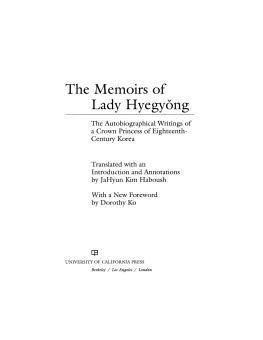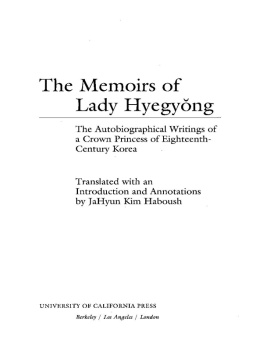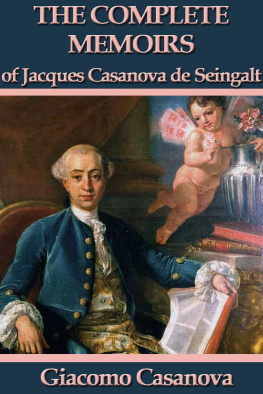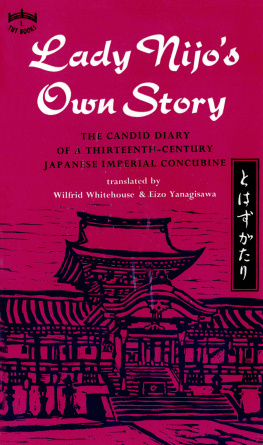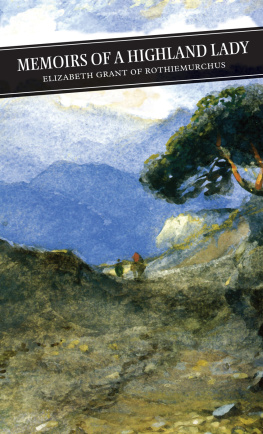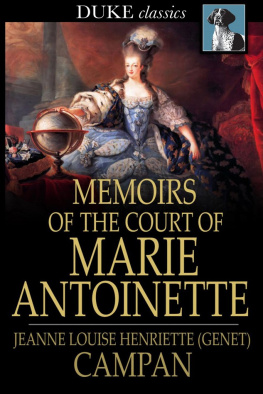
The Memoirs of Lady Hyegyng
The Memoirs of
Lady Hyegyng
The Autobiographical Writings of
a Crown Princess of Eighteenth-Century
Korea
Translated with an
Introduction and Annotations
by JaHyun Kim Haboush
With a New Foreword
by Dorothy Ko

UNIVERSITY OF CALIFORNIA PRESS
Berkeley/Los Angeles/London
University of California Press, one of the most distinguished university presses in the United States, enriches lives around the world by advancing scholarship in the humanities, social sciences, and natural sciences. Its activities are supported by the UC Press Foundation and by philanthropic contributions from individuals and institutions. For more information, visit www.ucpress.edu.
University of California Press
Berkeley and Los Angeles, California
University of California Press, Ltd.
London, England
1996, 2013 by The Regents of the University of California
ISBN 978-0-520-28048-9
eISBN 9780520957299
The Library of Congress has cataloged an earlier edition of this book as follows:
Library of Congress Cataloging-in-Publication Data
Hyegynggung Hong Ssi, 17351815.
[Hanjungnok. English]
The memoirs of Lady Hyegyng : the autobiographical writings of a Crown Princess of eighteenth-century Korea / translated with an introduction and annotations by JaHyun Kim Haboush.
p.cm.
Includes bibliographical references and index.
ISBN 978-0-520-20055-5 (pbk. : alk. paper)
1. Hyegynggung Hong Ssi, 17351815. 2. PrincessesKoreaBiography. 3. KoreaKings and rulers. 4. KoreaHistory16371864. I. Haboush, JaHyun Kim. II. Title.
DS913.392.H94A31996
951.902092dc20
[B]
94-40457
Manufactured in the United States of America
22 21 20 19 18 17 16 15 14 13
10 9 8 7 6 5 4 3 2 1
In keeping with a commitment to support environmentally responsible and sustainable printing practices, UC Press has printed this book on Natures Natural, a fiber that contains 30% post-consumer waste and meets the minimum requirements of ANSI/NISO Z 39.48-1992 ( R 1997) ( Permanence of Paper ).
To the memory of my mother and grandmother
Contents

Foreword
JaHyun Kim Haboush, who passed away on January 30, 2011, was an original. All of her work bears the unmistakable imprint of her temperament, intellectual habits, and vision, and this is especially true of The Memoirs of Lady Hyegyng. One may even say that in more ways than one, Lady JaHyun was Lady Hyegyng.
Ja Haboush wrote against the grain of conventional Korean history, especially those views shaped by the modern nationalistic agenda, by being attentive to the place of women, the politics of language, the richness of vernacular narratives, the power of emotions, and the global context. Neither Korea nor history looked the same as a result.
Above all, Ja Haboush is remembered as the visionary scholar who made female perspectives and diction mandatory for an understanding of the world of men. The four memoirs of Lady Hyegyng that this volume presents are but part of an array of writings produced by Chosn women that Haboush excavated to explain a paradox: Precisely during the period when women, or yangban [elite] women, were losing their inheritance rights, they began to write in quantity. subscribe to this mechanical, dualistic view and its implicit assumption of women as victims.
Instead, she reveals to us a world of conflicted priorities and subtle negotiations on the parts of fathers and daughters, husbands and wives, as customs and family structures shifted under the influence of Confucian norms and values. This larger historical picture of people caught between incompatible moral demands, or between private sentiments and public duties, finds concrete expression in the struggles of protagonists and villains alike in Lady Hyegyngs memoirs. Writing served larger purposes than voicing personal grief; the lady wrote to bear public witness to history, to ensure that the truth would not be lost. In so doing, she was fulfilling a Confucian demand for a moral man.
JaHyun was a lifelong devotee of the theaterfrom Korean Pansori, Chinese southern drama, and Shakespeare to Italian opera, she loved them all. Could this be why she was the first scholar working in the United States to recognize the power of emotions in shaping and altering the course of Chosn history? In Lady Hyegyngs world, emotions have material effects: fear causes diseases; anger can literally kill. Indeed, one of the most insidious effects of Confucian discourse on a Korean woman is the demand that she change her structure of feelings: a bride such as Lady Hyegyng has to switch her allegiance from her parents to her parents-in-law upon marriage. In vernacular novels that attracted nonelite readers, however, Haboush found a counterhegemonic discourse in which the daughter could remain filial to her father. From the perspective of women and gender, the institutions of Confucian patriarchy appear to be powerful but incomplete in these and other works that Haboush studied.
Matters of gender and emotion have often been relegated to the private realm. Indeed, Lady Hyegyng might have led an insular life confined to the palace compound, but her beliefs, thoughts, and actions carried weight in the public world of politics and the moral world on the cosmological level. Ja Haboushs daring, and her lasting achievement, is to capture the fluidity and complexity of history in multiple registers. She did so by focusing on how boundaries (be they public-private, male-female, national-local) were made and remade instead of assuming that they were immutable. In her soon-to-be posthumously published manuscript on the Great East Asian War of the late sixteenth and early seventeenth centuries, she argues that in rallying popular support to resist the invading Japanese and Manchu armies, the Chosn court made the radical move of addressing its people in Korean vernacular Adopting an international and regional perspective, Ja Haboush was able to make an original argument about the Korean nation, just as her multidimensional perspective had revolutionized our understanding of women.
Perhaps JaHyuns love of the theater also explains her mastery of dramatic irony in her own life. During the fifteen years she lived with cancer, unto the end, none but her closest kin had an inkling of her condition. I did not understand the source of her resolve and strength in holding such a secret to herself until I reread The Memoirs of Lady Hyegyng in preparation for writing this preface. To others, Lady Hyegyng may appear to be a hapless victim of palace intrigues, reduced to watching her husband, father, and brother perish in horror, but JaHyun would have none of that. In her historical judgment, the lady was not a victim but the master of her fate when she learned to accept what she could not change. In the last memoir, of 1805, she stands before usreaders in posteritybearing witness to the darkness in human hearts and the fragility of happiness in a tragic moment in Korean history. Having conquered her emotions of fear and guilt, the lady achieved a kind of serenity that is the source of her moral authority.
It could be that the resilience of Lady Hyegyng lent strength to Lady JaHyun. It could also be the case that Lady JaHyun, from her nuanced readings and renderings of the four memoirs, discovered a true Lady Hyegyng, who was traditionally obfuscated by slanders, innuendos, and conventional interpretations. It was the inner resolve and serenity of Lady JaHyun that crystallized and immortalized the heroic image of Lady Hyegyng. In other words, the Lady Hyegyng we will soon come to know intimately might not have existed if not for the personal investment, not to mention the historical sleuthing and imagination, of JaHyun Kim Haboush. Whatever the case, we have both ladies to thank for the heart-wrenching history we are about to witness.
Next page
